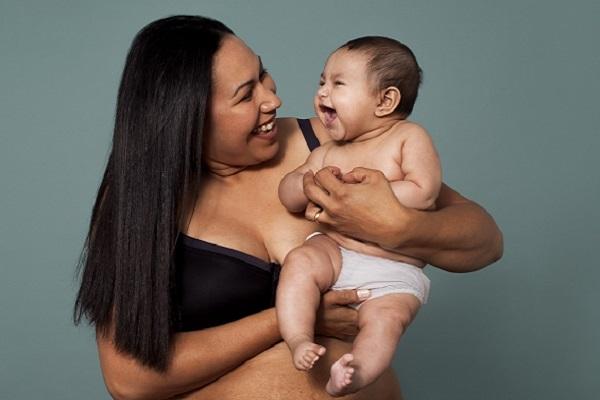Despite the movement for body positivity and anti-body shaming, more than half of mums are not proud of their post-baby bodies, according to research commissioned by Mothercare. The findings coincide with its latest campaign, Body Proud Mums, which champions the post-birth body and represents a part of motherhood that is rarely seen in media.
The research also revealed that over 80 percent of UK mums have admitted comparing their post-baby bodies to unrealistic ideals, with a quarter of mums feeling the most pressure from the media and almost half feeling the need to stack up to celebrities.
And worryingly, 90 percent of women in the 18-25 age group expect their bodies to compete with celebrities and what they see in the media. As a result, more than half (51 percent) of mums on social media are using apps/filters on photos of themselves to hide things about their appearance that they don’t like.
Over 61 percent of mums feel that BAME are still underrepresented, and it appears Northern Irish mums are the most insecure, with 67 percent feeling embarrassed about being undressed in front of their partners, while mums living in the East of England are the most confident, with 45 percent being proud of their post-natal body.
There is an obvious responsibility with those in media, whether they are celebrities or brands, to challenge these unrealistic expectations, as 84 percent of respondents feel the media should celebrate more realistic, honest imagery of ‘real’ post-birth bodies (e.g. stretch marks, scars, etc.).
With Body Proud Mums, Mothercare aims to combat unrealistic ideals by portraying real mums and their post-birth bodies, by showcasing the images of 10 mums in their latest campaign across London.
The campaign imagery was shot by photographer Sophie Mayanne who, in 2017, pledged to never digitally manipulate skin in her work. Sophie added: “The images depict the raw and incredibly emotional experience of childbirth. The aim is for mums of all shapes and sizes to be able to identify with these photos in one way or another, and to feel more confident with their imperfections.”
As Mothercare's research found that almost 40 percent of mums have been lastingly impacted by the changes that took place in their bodies, the global retailer is also working with national charities NCT and PANDAS, to offer advice and support to people suffering from ante and postnatal illnesses.
Liz Day, parenting consultant at mothercare said: “We hope that these honest photos showcase the diverse reality of the post-birth body and offer reassurance for mums that every body is beautiful and unique. From surgical scars to stretch marks, we want to celebrate and support – through our work with charities NCT and PANDAS - the true journey of motherhood and that includes the physical changes to the body.”
Linda Papadopulous, psychologist and author added: “The way we see and value our appearance, our ‘body image' can significantly affect our thoughts, feelings, behaviours and overall quality of life. The way we feel about our appearance and how we are accepted by those around us is the core of how we relate to others. mothercare has taken the opportunity to address this by portraying real mums as part of their ‘Body Proud Mums’ campaign. In the new media world that we live in our perceptions of how we think we should look may not be healthy, achievable or right for a particular individual.”
She continued: “This campaign hopes to reduce some of the pressures that new mums may be feeling by celebrating the body changes that come with motherhood rather than trying to edit them out. Very often, we end up showing compassion to others that we simply can’t show to ourselves when it comes to how we feel about our bodies”
Body Proud Mums came about through a TFL initiative, Women We See, a diversity-inclusive competition that challenged brands and creative agencies to celebrate women in all their diversity, with creative concepts that represented older women, BAME women, women with disabilities - be they visible or not - single parents, women from diverse socioeconomic backgrounds and women from the LGBT community.













